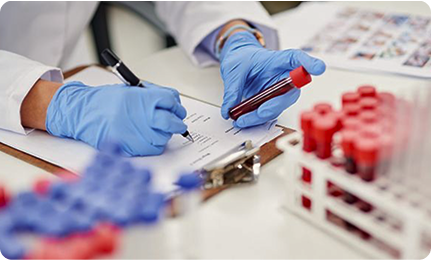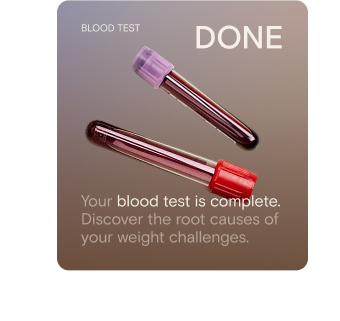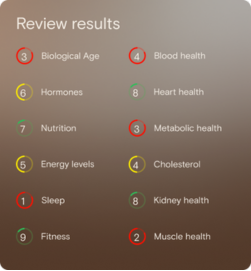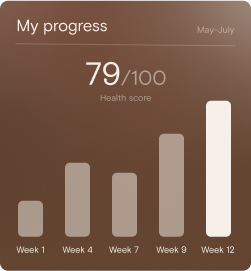What is hs-CRP?
High-sensitivity C-reactive protein (hs-CRP) is a version of the CRP test that detects very low concentrations of C-reactive protein (in mg/L). It reflects low-level systemic inflammation rather than acute infection. CRP is synthesised by the liver when signalling molecules (e.g. from immune cells) are active, and hs-CRP is simply a more sensitive method for measuring the “background” inflammatory state.
Why does it matter for long-term health and wellbeing?
Inflammation is a core pathway linking metabolic stress, cellular damage, and ageing. Persistent elevation of hs-CRP, seen on a blood work CRP test, correlates with reduced metabolic efficiency, increased oxidative stress, and slower repair over time. While not a diagnostic tool on its own, it acts as a barometer of how activated the body is, signalling when intervention may be needed. Growing evidence shows that optimising inflammatory balance supports long-term metabolic health, energy, and resilience.
What’s an optimal level of hs-CRP?
- Optimal (target) range: ≤ 1 mg/L
- Reference (lab) “average” range: 1 to 3 mg/L
- Raised levels to monitor: > 3 mg/L (moderate elevation)
- Possible acute/inflammatory states: > 10 mg/L (may suggest more acute or focal inflammation requiring further investigation)
The idea is that lower is better (within reason), and that trends over time are more important than single snapshots.
What influences hs-CRP levels?
Many lifestyle, physiologic and environmental factors can push hs-CRP up or down, including:
- Body composition (especially excess abdominal fat)
- Diet (high in processed foods, sugar, trans fats)
- Physical activity / inactivity
- Sleep quality and duration
- Chronic stress, psychosocial load
- Smoking, alcohol consumption
- Acute infections, injuries or trauma
- Underlying subclinical inflammation (e.g. in gut, joints)
- Genetic predisposition and individual immune responsiveness
Because hs-CRP is non-specific, any transient infections or injuries may temporarily elevate it, which is why repeated measures are useful.
What does it mean if hs-CRP is outside the optimal range?
If your hs-CRP sits above the optimal level (≤ 1 mg/L) but remains within the lab average range of 1–3 mg/L, a CRP blood check may suggest your body is slightly tilted toward inflammatory stress. This does not necessarily indicate disease, but it highlights an opportunity to optimise lifestyle levers such as nutrition, movement, and recovery.
When hs-CRP rises above 3 mg/L on a CRP blood test, it signals greater strain on your current balance, while levels above 10 mg/L often point to a more acute inflammatory driver and warrant further evaluation or retesting. In all cases, lifestyle changes remain the primary tools for guiding levels back toward your target baseline.
How can I support healthy hs-CRP levels?
To support lower, stable hs-CRP, you can focus on the following evidence-based lifestyle strategies:
- Anti-inflammatory whole foods: prioritise nutrient-dense plant foods, omega-3 rich fats (e.g. oily fish, seeds), minimise ultra-processed foods, refined sugar, and industrial trans fats.
- Regular movement: both aerobic (e.g. walking, cycling) and resistance training help moderate inflammatory signalling.
- Maintain healthy body composition: reducing excess fat (especially central fat) often lowers baseline inflammation.
- Sleep and recovery: consistent, quality sleep (7–9 h) supports immune regulation and reduces stress burden.
- Stress management: mindfulness, meditation, breathing techniques, social connection—all help buffer chronic inflammatory reactivity.
- Avoid smoking and moderate alcohol: both are established drivers of inflammation.
- Environmental supports: reduce exposures to pollutants, maintain healthy gut (via diet, fibre, probiotic diversity), ensure good hygiene and periodic evaluation if any chronic irritants exist.
Over months, combining those strategies often leads to a downward trend in hs-CRP — which you can monitor via repeat tests.
This information is provided for general health and wellness purposes only and does not replace medical advice.
References
- Royal College of Pathologists of Australasia. (n.d.). C reactive protein – RCPA Manual.
- Monash Health Pathology. (2024, August 6). Reference Intervals Master List (Issue 13).
- Healthdirect Australia. (n.d.). C-reactive protein (CRP) blood test.
- National Health and Medical Research Council. (2013). The Australian Dietary Guidelines (2013 ed.).
.png)



















.png)
